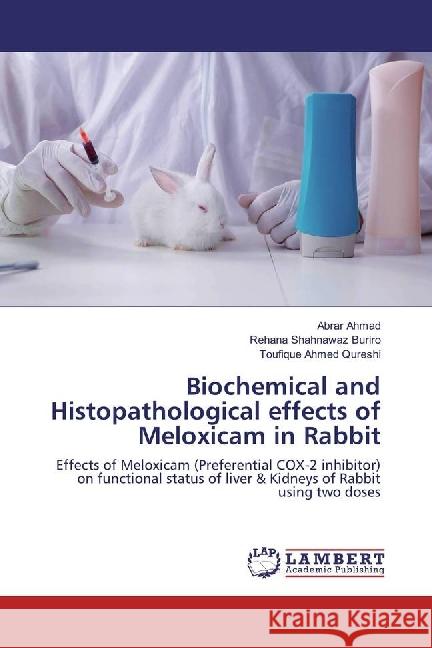Biochemical and Histopathological effects of Meloxicam in Rabbit : Effects of Meloxicam (Preferential COX-2 inhibitor) on functional status of liver & Kidneys of Rabbit using two doses » książka
Biochemical and Histopathological effects of Meloxicam in Rabbit : Effects of Meloxicam (Preferential COX-2 inhibitor) on functional status of liver & Kidneys of Rabbit using two doses
ISBN-13: 9786202096102 / Angielski / Miękka / 2017 / 100 str.
Biochemical and Histopathological effects of Meloxicam in Rabbit : Effects of Meloxicam (Preferential COX-2 inhibitor) on functional status of liver & Kidneys of Rabbit using two doses
ISBN-13: 9786202096102 / Angielski / Miękka / 2017 / 100 str.
(netto: 214,57 VAT: 5%)
Najniższa cena z 30 dni: 224,77 zł
ok. 10-14 dni roboczych.
Darmowa dostawa!
Meloxicam usage in veterinary practice is remarkably increased in the past few years as it was demonstrated in a variety of animal models to be an eco-friendly substitute for Diclofenac which caused catastrophic decline in vulture population in the sub-continent. It has been shown that Meloxicam possess higher therapeutic index compared to other NSAIDs such as diclofenac, indomethacin and piroxicam. Meloxicam has been shown to hold excellent tolerability at various routes of administration however keeping in mind the veterinary norms, it is generally recommended for parenteral usage especially in large animals. Several studies has been made in the past to test pharmacokinetic profile, expected renal or hepatic injury through serum biochemical indicators and histopathological examination, analgesic effects and the risk for gastrointestinal ulceration. Despite the fact that meloxicam has proven reason to be the best substitute to either diclofenac or any other conventional NSAID in animals and avian species, still there are plenty of reports which showed toxicities on organs.











